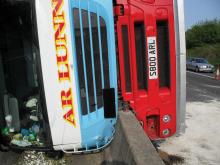The vital importance of better data to improve road safety has led international road safety experts from 40 countries to issue the Buenos Aires Declaration on Better Safety Data for Better Road Safety Outcomes.
The vital importance of better data to improve road safety has led international road safety experts from 40 countries to issue the Buenos Aires Declaration on Better Safety Data for Better Road Safety Outcomes.
The Declaration recommends 12 measures for improving the collection and analysis of road safety data as a critical tool to design effective road safety policies. Among these are: the requirement for a minimum set of data for analysing road safety, which includes not only safety data but also contextual data; safety data should be aggregated at national level using a lead national agency; and the need to understand the relationship between road safety performance and economic development.
The recommendations are a result of the ongoing road safety work of ITF's International Road Traffic Safety Data and Analysis Group (IRTAD) and the Ibero-American Road Safety Observatory (OISEVI), a co-operative body of Latin American countries for the reduction of road accidents by improvements in safety data. Better data is seen as fundamental to achieving the objectives of the UN Decade of Action on Road Safety; a halving the expected level of road deaths by 2020.
Over 1.24 million people die every year on the world’s roads, and another 20 to 50 million sustain non-fatal injuries as a result of road traffic crashes, as reported in the WHO Global Status Report on Road Safety.
The Declaration recommends 12 measures for improving the collection and analysis of road safety data as a critical tool to design effective road safety policies. Among these are: the requirement for a minimum set of data for analysing road safety, which includes not only safety data but also contextual data; safety data should be aggregated at national level using a lead national agency; and the need to understand the relationship between road safety performance and economic development.
The recommendations are a result of the ongoing road safety work of ITF's International Road Traffic Safety Data and Analysis Group (IRTAD) and the Ibero-American Road Safety Observatory (OISEVI), a co-operative body of Latin American countries for the reduction of road accidents by improvements in safety data. Better data is seen as fundamental to achieving the objectives of the UN Decade of Action on Road Safety; a halving the expected level of road deaths by 2020.
Over 1.24 million people die every year on the world’s roads, and another 20 to 50 million sustain non-fatal injuries as a result of road traffic crashes, as reported in the WHO Global Status Report on Road Safety.






